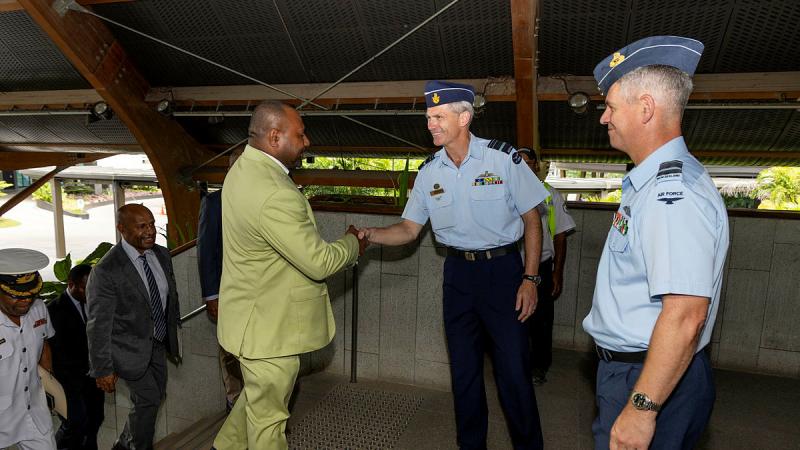Minister for Finance, Minister for Women, Minister for the Public Service
ANDREW CLENNELL, HOST: It’s my understanding that you and the Treasurer will be delivering a surplus for 22/23 in Tuesday’s Budget, how big will it be?
SENATOR THE HON KATY GALLAGHER, MINISTER FOR FINANCE: Well, Andrew, people will have to wait for Tuesday night to see the Budget in full, but I think the Treasurer and I have been clear that, for some time now, that there’s a significant improvement in the short term, but the longer term years, the out years of the Budget and into the medium term remain a significant Budget challenge. So people will see the numbers on Tuesday night, but there’s still, certainly, a welcome improvement but a big job ahead of us as we continue to repair the Budget.
CLENNELL: Look, I know you feel probably you can’t confirm it now, but I am, I’m pretty justified in believing this, I believe. If that were to occur, the surplus, that must feel, would feel like quite an achievement for you and the Treasurer. I know what you’re saying about the years going forward but you know, Wayne Swan predicted them, Josh Frydenberg predicted them, the Coalition made a big deal of it. How much of a big deal would that be for you and the Treasurer if that were to occur?
GALLAGHER: Well, again, the significant improvement we’re seeing in the near term is welcome, and a part of that is obviously the things that we’re selling overseas, we’re getting good money for, our employment levels are very strong, and that means our payments for people are less than what would have been normally expected to be. So there’s a combination of things there, but there’s also, a big part is around the restraint we’re showing, the fact that in October, we banked a lot of the revenue upgrades, you’ll see a continuation of that approach where we’re serious about Budget repair, we want to show restraint. We want to make investments where we can afford them, but there’s a bigger Budget repair story that we need to continue to work on and you’ll see that work doesn’t finish on Tuesday night, if anything, you know, it accelerates as we work on the longer term and medium-term pressures.
CLENNELL: It’s also my understanding that even though it’s been reported there are JobSeeker changes for over 55’s, perhaps only over 55’s, that you have been able through the Budget situation to extend that. Is it possible there’ll be a modest rise to all JobSeeker payments on Tuesday night?
GALLAGHER: Well, there’s certainly a lot of speculation around the place at the moment about what the Budget has got in it, what it doesn’t have in it. I can confirm there will be a significant or substantial cost of living package that’s included in the Budget, that’s targeted to those who are most vulnerable. And you will see that on Tuesday night. We’ve made no secret that we wanted to review all the payments every Budget to make sure we could do what we can, you’d expect Labor governments to do that. We’ve been doing that work through this Budget, but we’ve also been mindful of other pressures on the Budget and other people, you know, other areas where we have to invest as well. So I think the Budget overall, you’ll see that strong cost of living package, Andrew, but you’ll also see, you know, I guess a Budget is thousands of decisions taken together, which create the final Budget document, which is really about how you balance up all of those competing pressures. And you’ll see that on Tuesday night. We are in the very irritating part of the Budget process, this final few days before Tuesday, where there’s a lot of speculation, and you know, we’re all sitting here saying wait to see what’s in the Budget on Tuesday.
CLENNELL: No, I appreciate that. I see the difficulties for you sort of on both sides, though, if I can put this scenario to you. If you were to deliver a surplus, people would be saying where you should be doing more on JobSeeker and on all these other demands and requests for new money. On the other hand, we can see with the rate rise on Tuesday and inflation generally, if you did too much, you could blow the whole show up, couldn’t you? I mean, that’s sort of where you’re at, isn’t it?
GALLAGHER: Yeah look, it’s been a challenging environment to land a Budget, there’s no doubt about that. Inflation being the key challenge, how we respond to that, partly, is through the restraint that we need to show. We don’t want to be making the Reserve Bank’s job harder, so we are mindful of that and it’s been central to some of our thinking. But we’re also having to do a couple of other things as you would expect in any Budget. Any Budget isn’t just about one thing, it’s about a whole range of things. So you know, looking at how we can make that sensible cost of living investments where we can and where it doesn’t add to inflation, and also deal with some of these other issues we’ve uncovered, some of the legacy issues and terminating measures issues. And also where we look to find savings and reprioritise within government, that gets a good outcome too. So you’ll see all of that in the Budget, you’ll see, you know, that we are deadly serious about our fiscal strategy, about Budget repair, but we’re also a Labor government, a government with a heart that wants to do the right thing where we can afford it, in a responsible way, to make a difference in people’s lives.
CLENNELL: And just on that. The change to the single parent pension that’s been flagged, it’s certainly almost been confirmed, there will be a change. That’s quite personal for both you and the Prime Minister, isn’t it?
GALLAGHER: Well, I think, when you’ve lived on a payment, you come with an additional perspective, I think, that those that haven’t lived on a payment might not have experienced. So for me, and I don’t want to speak for the PM, but obviously, you know, his story is well known. For me, you know, unexpectedly found myself on a widow’s pension, and then the sole parent payment pretty early in my life. And, you know, for me, it was life changing. So I completely understand why we have a safety net, why it’s important to do what you can where you can to make sure you’re making a difference and supporting people through what’s often very difficult periods in their life. And we have to balance that up with how do we move people off payments as well, which is, you know, what happened in my circumstance where it was the support of the payment that allowed me to move off the payment. And, you know, we’ve been mindful of all of that, as we put this Budget together, but yeah, it’s been a very challenging set of circumstances. It’s my first full Budget process, I’m looking forward to Tuesday night just so we can, you know, have a discussion more openly about all the things that are in there.
CLENNELL: And also, the Treasurer has flagged a couple of times, a cleaner energy package. I guess, appropriate timing with the news on Snowy Hydro this week, isn’t it? Is that, is that game changing what we’re going to see on clean energy in the Budget?
GALLAGHER: Well, there’ll definitely be a focus as I would expect Budgets in the future will, as we continue this, you know, to try to seize the economic opportunities that come with the transformation to a cleaner energy environment. Obviously, as part of our cost of living package, we’ll have those energy payments again, which is trying to deal with some of the pressures people have been seeing with their energy bills. But, we need to also, while we’re doing that, support the, you know, the transition that’s occurring in front of our eyes, and make sure we seize the opportunities that come with that. And that’s not going to be solved in one Budget. You’ll see that over a course of Budgets, I think, as we continue this transition to electrify our economy. And yeah, I mean, that’s part of the growth story in the Budget and it’s an important part of any Budget, not only what you’re doing to ease cost of living pressures and help households, it’s also what are you doing about the opportunities ahead. And that’s why I, when I’m talking about the Budget with people, I say, don’t look at it as one measure, or one response, look across the Budget with everything that we’re balancing here and see the Budget in the context of, you know, these are the decisions we’ve taken here, and then we continue on in government and we’ll continue with the strategy we’ve outlined
CLENNELL: And the aged care worker pay rise, you’re confident that and other wage rises won’t drive up inflation?
GALLAGHER: Well, we haven’t seen wages as part of the inflation issue in the country. So we don’t think you know, and I don’t think there’s any evidence that would say that wage rises are fuelling inflation. We want sensible and sustainable wage increases. Obviously, this aged care one has been a long time in the making and I think what it’s dealing with is, in a sense, the undervaluing and underpayment of a critical and essential workforce. You know, we’ve made provision for those wages, we know the care economy is a huge opportunity in terms of economic growth, as well. We know that’s where there’s going to be a lot of growth in jobs, we need to find more workers, if we’re going to do that we’re going to have to find – they’re going to have to be paid properly. But again, this is, you know, responding to a Fair Work Commission case, we committed to funding it, we’re delivering on that. And I have to say, for 90% of that workforce, that is women in undervalued, underpaid work, this is a very good outcome.
CLENNELL: And just finally, why was it important with the new Defence spending over the forward estimates that that come from savings as opposed to being new money?
GALLAGHER: Well, you’ll see the Budget when it’s handed down on Tuesday around Defence and Defence spending. But we’ve worked really closely, Jim and I, and we really appreciate the work that Richard Marles and his team have put in to looking at where, as we kind of reposition the Defence Force, the opportunities to reprioritise within existing envelopes, I mean, the Defence Force, the Defence budget is funded a bit differently to other budgets in the sense that they get a provision, which they allocate, and it’s a longer term provision, and so they perhaps have more opportunities than other departments to reprioritise within that. I’m not saying it’s easy for them at all, but we certainly appreciate that they’ve been able to look at their existing spending and look at where they can make, you know, reprioritise within that, but we have also accepted that outside the forwards and into the medium term, there will have to be extra investment in Defence to deliver on the, you know, security and safety of our citizens, and we’re committed to funding that as well.
CLENNELL: Katy Gallagher, thanks so much for your time this afternoon.
GALLAGHER: Thanks very much for having me on, Andrew.







